
Elvis Presley
Born: 8 January 1935
Died: 16 August 1977 (42 Years)
Cause: While an autopsy, undertaken the same day Presley died, was still in progress, Memphis medical examiner Jerry Francisco announced that the immediate cause of death was cardiac arrest. Asked if drugs were involved, he declared that "drugs played no role in Presley's death". In fact, "drug use was heavily implicated" in Presley's death, writes Guralnick.
Died: 16 August 1977 (42 Years)
Cause: While an autopsy, undertaken the same day Presley died, was still in progress, Memphis medical examiner Jerry Francisco announced that the immediate cause of death was cardiac arrest. Asked if drugs were involved, he declared that "drugs played no role in Presley's death". In fact, "drug use was heavily implicated" in Presley's death, writes Guralnick.
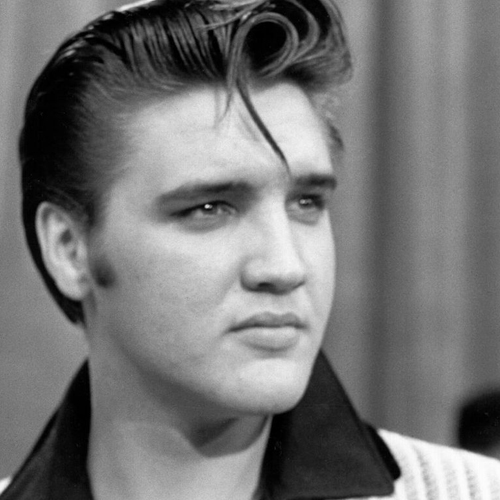
Elvis Presley
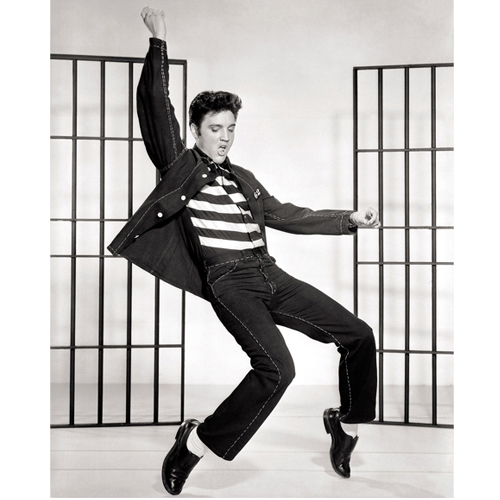
Elvis Presley
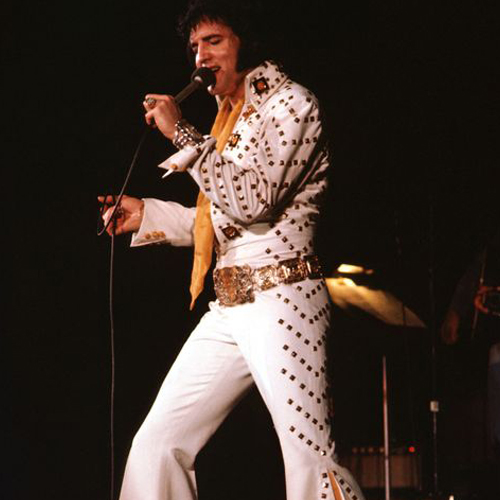
Elvis Presley
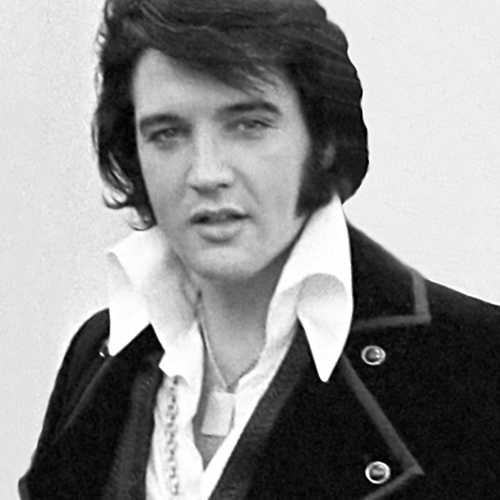
Elvis Presley
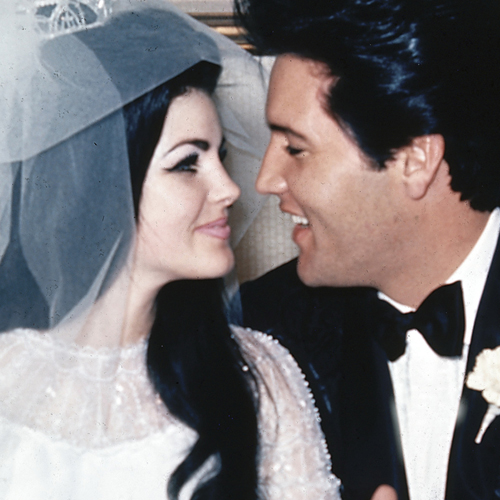
Elvis Presley
Elvis Aaron Presley (January 8, 1935 – August 16, 1977), often known simply as Elvis, was an American singer and actor. Dubbed the "King of Rock and Roll", he is regarded as one of the most significant cultural figures of the 20th century. His energized interpretations of songs and sexually provocative performance style, combined with a singularly potent mix of influences across color lines during a transformative era in race relations, led him to both great success and initial controversy.
Presley was born in Tupelo, Mississippi, and relocated to Memphis, Tennessee, with his family when he was 13 years old. His music career began there in 1954, recording at Sun Records with producer Sam Phillips, who wanted to bring the sound of African-American music to a wider audience. Presley, on rhythm acoustic guitar, and accompanied by lead guitarist Scotty Moore and bassist Bill Black, was a pioneer of rockabilly, an uptempo, backbeat-driven fusion of country music and rhythm and blues. In 1955, drummer D. J. Fontana joined to complete the lineup of Presley's classic quartet and RCA Victor acquired his contract in a deal arranged by Colonel Tom Parker, who would manage him for more than two decades. Presley's first RCA Victor single, "Heartbreak Hotel", was released in January 1956 and became a number-one hit in the United States. Within a year, RCA would sell ten million Presley singles. With a series of successful network television appearances and chart-topping records, Presley became the leading figure of the newly popular sound of rock and roll, though his performative style and promotion of the then-marginalized sound of African-Americans led to him being widely considered a threat to the moral well-being of the White American youth.
In November 1956, Presley made his film debut in Love Me Tender. Drafted into military service in 1958, Presley relaunched his recording career two years later with some of his most commercially successful work. He held few concerts, however, and guided by Parker, proceeded to devote much of the 1960s to making Hollywood films and soundtrack albums, most of them critically derided. Some of his most famous films included Jailhouse Rock (1957), Blue Hawaii (1961), and Viva Las Vegas (1964). In 1968, following a seven-year break from live performances, he returned to the stage in the acclaimed television comeback special Elvis, which led to an extended Las Vegas concert residency and a string of highly profitable tours. In 1973, Presley gave the first concert by a solo artist to be broadcast around the world, Aloha from Hawaii. Years of prescription drug abuse and unhealthy eating habits severely compromised his health, and he died suddenly in 1977 at his Graceland estate at the age of 42.
Having sold over 500 million records worldwide, Presley is recognized as the best-selling solo music artist of all time by Guinness World Records. He was commercially successful in many genres, including pop, country, rhythm & blues, adult contemporary, and gospel. Presley won three Grammy Awards, received the Grammy Lifetime Achievement Award at age 36, and has been inducted into multiple music halls of fame. He holds several records, including the most RIAA certified gold and platinum albums, the most albums charted on the Billboard 200, the most number-one albums by a solo artist on the UK Albums Chart, and the most number-one singles by any act on the UK Singles Chart. In 2018, Presley was posthumously awarded the Presidential Medal of Freedom.
On the evening of Tuesday, August 16, 1977, Presley was scheduled to fly out of Memphis to begin another tour. That afternoon, Ginger Alden discovered him in an unresponsive state on the bathroom floor of his Graceland mansion. According to her eyewitness account, "Elvis looked as if his entire body had completely frozen in a seated position while using the toilet and then had fallen forward, in that fixed position, directly in front of it. ... It was clear that, from the time whatever hit him to the moment he had landed on the floor, Elvis hadn't moved." Attempts to revive him failed, and he was pronounced dead at Baptist Memorial Hospital at 3:30 p.m. He was 42 years old.
President Jimmy Carter issued a statement that credited Presley with having "permanently changed the face of American popular culture". Thousands of people gathered outside Graceland to view the open casket. One of Presley's cousins, Billy Mann, accepted $18,000 to secretly photograph the body; the picture appeared on the cover of the National Enquirer's biggest-selling issue ever. Alden struck a $105,000 deal with the Enquirer for her story, but settled for less when she broke her exclusivity agreement. Presley left her nothing in his will.
Presley's funeral was held at Graceland on Thursday, August 18. Outside the gates, a car plowed into a group of fans, killing two young women and critically injuring a third. About 80,000 people lined the processional route to Forest Hill Cemetery, where Presley was buried next to his mother. Within a few weeks, "Way Down" topped the country and UK singles chart. Following an attempt to steal Presley's body in late August, the remains of both Presley and his mother were exhumed and reburied in Graceland's Meditation Garden on October 2.
Presley was born in Tupelo, Mississippi, and relocated to Memphis, Tennessee, with his family when he was 13 years old. His music career began there in 1954, recording at Sun Records with producer Sam Phillips, who wanted to bring the sound of African-American music to a wider audience. Presley, on rhythm acoustic guitar, and accompanied by lead guitarist Scotty Moore and bassist Bill Black, was a pioneer of rockabilly, an uptempo, backbeat-driven fusion of country music and rhythm and blues. In 1955, drummer D. J. Fontana joined to complete the lineup of Presley's classic quartet and RCA Victor acquired his contract in a deal arranged by Colonel Tom Parker, who would manage him for more than two decades. Presley's first RCA Victor single, "Heartbreak Hotel", was released in January 1956 and became a number-one hit in the United States. Within a year, RCA would sell ten million Presley singles. With a series of successful network television appearances and chart-topping records, Presley became the leading figure of the newly popular sound of rock and roll, though his performative style and promotion of the then-marginalized sound of African-Americans led to him being widely considered a threat to the moral well-being of the White American youth.
In November 1956, Presley made his film debut in Love Me Tender. Drafted into military service in 1958, Presley relaunched his recording career two years later with some of his most commercially successful work. He held few concerts, however, and guided by Parker, proceeded to devote much of the 1960s to making Hollywood films and soundtrack albums, most of them critically derided. Some of his most famous films included Jailhouse Rock (1957), Blue Hawaii (1961), and Viva Las Vegas (1964). In 1968, following a seven-year break from live performances, he returned to the stage in the acclaimed television comeback special Elvis, which led to an extended Las Vegas concert residency and a string of highly profitable tours. In 1973, Presley gave the first concert by a solo artist to be broadcast around the world, Aloha from Hawaii. Years of prescription drug abuse and unhealthy eating habits severely compromised his health, and he died suddenly in 1977 at his Graceland estate at the age of 42.
Having sold over 500 million records worldwide, Presley is recognized as the best-selling solo music artist of all time by Guinness World Records. He was commercially successful in many genres, including pop, country, rhythm & blues, adult contemporary, and gospel. Presley won three Grammy Awards, received the Grammy Lifetime Achievement Award at age 36, and has been inducted into multiple music halls of fame. He holds several records, including the most RIAA certified gold and platinum albums, the most albums charted on the Billboard 200, the most number-one albums by a solo artist on the UK Albums Chart, and the most number-one singles by any act on the UK Singles Chart. In 2018, Presley was posthumously awarded the Presidential Medal of Freedom.
On the evening of Tuesday, August 16, 1977, Presley was scheduled to fly out of Memphis to begin another tour. That afternoon, Ginger Alden discovered him in an unresponsive state on the bathroom floor of his Graceland mansion. According to her eyewitness account, "Elvis looked as if his entire body had completely frozen in a seated position while using the toilet and then had fallen forward, in that fixed position, directly in front of it. ... It was clear that, from the time whatever hit him to the moment he had landed on the floor, Elvis hadn't moved." Attempts to revive him failed, and he was pronounced dead at Baptist Memorial Hospital at 3:30 p.m. He was 42 years old.
President Jimmy Carter issued a statement that credited Presley with having "permanently changed the face of American popular culture". Thousands of people gathered outside Graceland to view the open casket. One of Presley's cousins, Billy Mann, accepted $18,000 to secretly photograph the body; the picture appeared on the cover of the National Enquirer's biggest-selling issue ever. Alden struck a $105,000 deal with the Enquirer for her story, but settled for less when she broke her exclusivity agreement. Presley left her nothing in his will.
Presley's funeral was held at Graceland on Thursday, August 18. Outside the gates, a car plowed into a group of fans, killing two young women and critically injuring a third. About 80,000 people lined the processional route to Forest Hill Cemetery, where Presley was buried next to his mother. Within a few weeks, "Way Down" topped the country and UK singles chart. Following an attempt to steal Presley's body in late August, the remains of both Presley and his mother were exhumed and reburied in Graceland's Meditation Garden on October 2.
Cause of death
While an autopsy, undertaken the same day Presley died, was still in progress, Memphis medical examiner Jerry Francisco announced that the immediate cause of death was cardiac arrest. Asked if drugs were involved, he declared that "drugs played no role in Presley's death". In fact, "drug use was heavily implicated" in Presley's death, writes Guralnick. The pathologists conducting the autopsy thought it possible, for instance, that he had suffered "anaphylactic shock brought on by the codeine pills he had gotten from his dentist, to which he was known to have had a mild allergy". A pair of lab reports filed two months later strongly suggested that polypharmacy was the primary cause of death; one reported "fourteen drugs in Elvis' system, ten in significant quantity". In 1979, forensic pathologist Cyril Wecht conducted a review of the reports and concluded that a combination of central nervous system depressants had resulted in Presley's accidental death. Forensic historian and pathologist Michael Baden viewed the situation as complicated: "Elvis had had an enlarged heart for a long time. That, together with his drug habit, caused his death. But he was difficult to diagnose; it was a judgment call."
The competence and ethics of two of the centrally involved medical professionals were seriously questioned. Francisco had offered a cause of death before the autopsy was complete; claimed the underlying ailment was cardiac arrhythmia, a condition that can be determined only in someone who is still alive; and denied drugs played any part in Presley's death before the toxicology results were known. Allegations of a cover-up were widespread. While a 1981 trial of Presley's main physician, George Nichopoulos, exonerated him of criminal liability for his death, the facts were startling: "In the first eight months of 1977 alone, he had [prescribed] more than 10,000 doses of sedatives, amphetamines, and narcotics: all in Elvis' name." His license was suspended for three months. It was permanently revoked in the 1990s after the Tennessee Medical Board brought new charges of over-prescription.
In 1994, the Presley autopsy report was reopened. Joseph Davis, who had conducted thousands of autopsies as Miami-Dade County coroner, declared at its completion, "There is nothing in any of the data that supports a death from drugs. In fact, everything points to a sudden, violent heart attack." More recent research has revealed that Francisco did not speak for the entire pathology team. Other staff "could say nothing with confidence until they got the results back from the laboratories, if then. That would be a matter of weeks." One of the examiners, E. Eric Muirhead, "could not believe his ears. Francisco had not only presumed to speak for the hospital's team of pathologists, he had announced a conclusion that they had not reached. ... Early on, a meticulous dissection of the body ... confirmed [that] Elvis was chronically ill with diabetes, glaucoma, and constipation. As they proceeded, the doctors saw evidence that his body had been wracked over a span of years by a large and constant stream of drugs. They had also studied his hospital records, which included two admissions for drug detoxification and methadone treatments." Writer Frank Coffey thought Presley's death was due to "a phenomenon called the Valsalva maneuver (essentially straining on the toilet leading to heart stoppage—plausible because Elvis suffered constipation, a common reaction to drug use)". In similar terms, Dan Warlick, who was present at the autopsy, "believes Presley's chronic constipation—the result of years of prescription drug abuse and high-fat, high-cholesterol gorging—brought on what's known as Valsalva's maneuver. Put simply, the strain of attempting to defecate compressed the singer's abdominal aorta, shutting down his heart."
However, in 2013, Forest Tennant, who had testified as a defense witness in Nichopoulos' trial, described his own analysis of Presley's available medical records. He concluded that Presley's "drug abuse had led to falls, head trauma, and overdoses that damaged his brain", and that his death was due in part to a toxic reaction to codeine—exacerbated by an undetected liver enzyme defect—which can cause sudden cardiac arrhythmia. DNA analysis in 2014 of a hair sample, purported to be Presley's, found evidence of genetic variants that can lead to glaucoma, migraines, and obesity; a crucial variant associated with the heart muscle disease hypertrophic cardiomyopathy was also identified.
(wikipedia)
While an autopsy, undertaken the same day Presley died, was still in progress, Memphis medical examiner Jerry Francisco announced that the immediate cause of death was cardiac arrest. Asked if drugs were involved, he declared that "drugs played no role in Presley's death". In fact, "drug use was heavily implicated" in Presley's death, writes Guralnick. The pathologists conducting the autopsy thought it possible, for instance, that he had suffered "anaphylactic shock brought on by the codeine pills he had gotten from his dentist, to which he was known to have had a mild allergy". A pair of lab reports filed two months later strongly suggested that polypharmacy was the primary cause of death; one reported "fourteen drugs in Elvis' system, ten in significant quantity". In 1979, forensic pathologist Cyril Wecht conducted a review of the reports and concluded that a combination of central nervous system depressants had resulted in Presley's accidental death. Forensic historian and pathologist Michael Baden viewed the situation as complicated: "Elvis had had an enlarged heart for a long time. That, together with his drug habit, caused his death. But he was difficult to diagnose; it was a judgment call."
The competence and ethics of two of the centrally involved medical professionals were seriously questioned. Francisco had offered a cause of death before the autopsy was complete; claimed the underlying ailment was cardiac arrhythmia, a condition that can be determined only in someone who is still alive; and denied drugs played any part in Presley's death before the toxicology results were known. Allegations of a cover-up were widespread. While a 1981 trial of Presley's main physician, George Nichopoulos, exonerated him of criminal liability for his death, the facts were startling: "In the first eight months of 1977 alone, he had [prescribed] more than 10,000 doses of sedatives, amphetamines, and narcotics: all in Elvis' name." His license was suspended for three months. It was permanently revoked in the 1990s after the Tennessee Medical Board brought new charges of over-prescription.
In 1994, the Presley autopsy report was reopened. Joseph Davis, who had conducted thousands of autopsies as Miami-Dade County coroner, declared at its completion, "There is nothing in any of the data that supports a death from drugs. In fact, everything points to a sudden, violent heart attack." More recent research has revealed that Francisco did not speak for the entire pathology team. Other staff "could say nothing with confidence until they got the results back from the laboratories, if then. That would be a matter of weeks." One of the examiners, E. Eric Muirhead, "could not believe his ears. Francisco had not only presumed to speak for the hospital's team of pathologists, he had announced a conclusion that they had not reached. ... Early on, a meticulous dissection of the body ... confirmed [that] Elvis was chronically ill with diabetes, glaucoma, and constipation. As they proceeded, the doctors saw evidence that his body had been wracked over a span of years by a large and constant stream of drugs. They had also studied his hospital records, which included two admissions for drug detoxification and methadone treatments." Writer Frank Coffey thought Presley's death was due to "a phenomenon called the Valsalva maneuver (essentially straining on the toilet leading to heart stoppage—plausible because Elvis suffered constipation, a common reaction to drug use)". In similar terms, Dan Warlick, who was present at the autopsy, "believes Presley's chronic constipation—the result of years of prescription drug abuse and high-fat, high-cholesterol gorging—brought on what's known as Valsalva's maneuver. Put simply, the strain of attempting to defecate compressed the singer's abdominal aorta, shutting down his heart."
However, in 2013, Forest Tennant, who had testified as a defense witness in Nichopoulos' trial, described his own analysis of Presley's available medical records. He concluded that Presley's "drug abuse had led to falls, head trauma, and overdoses that damaged his brain", and that his death was due in part to a toxic reaction to codeine—exacerbated by an undetected liver enzyme defect—which can cause sudden cardiac arrhythmia. DNA analysis in 2014 of a hair sample, purported to be Presley's, found evidence of genetic variants that can lead to glaucoma, migraines, and obesity; a crucial variant associated with the heart muscle disease hypertrophic cardiomyopathy was also identified.
(wikipedia)

